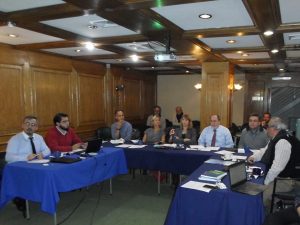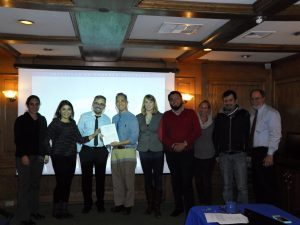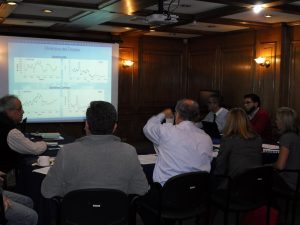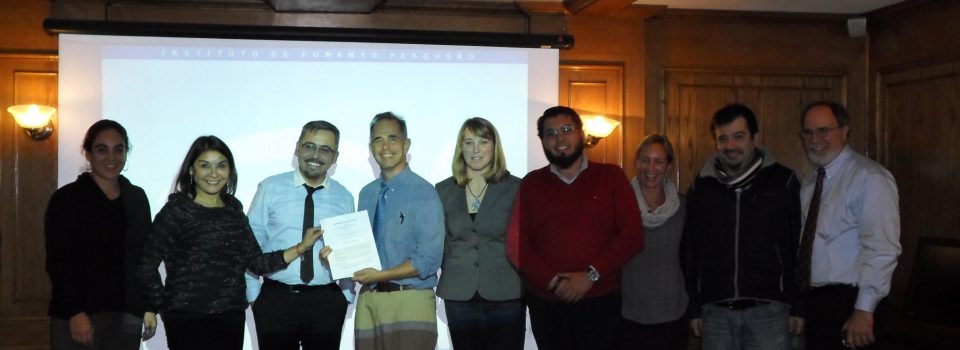IFOP signs a Cooperation Agreement with Environmental Defense Fund (EDF) from United States.
July 19th, 2017 As part of its strategic planning, IFOP met with the Environmental Defense Fund (EDF) to exchange experiences in the research field on fisheries economic and social issues. At the meeting they signed a Cooperation Agreement to address the socio-economic aspects of the national fisheries.
As part of its strategic planning, IFOP met with the Environmental Defense Fund (EDF) to exchange experiences in the research field on fisheries economic and social issues. At the meeting they signed a Cooperation Agreement to address the socio-economic aspects of the national fisheries.
On July 13th, an agreement was signed by the Environmental Protection Fund (EDF) ( https://www.edf.org ) of the United States of America, and IFOP from Chile in the auditorium of the Institute of Fisheries Development (IFOP) . It was signed by Tom Grasso, Senior Director of the Oceans Program at EDF, and Mauricio Gálvez, Executive Director (S) of IFOP and agreed to develop a work program with the prospect of implementing it jointly from 2018 and on.
Erica Cunningham, Douglas Rader, Thomas Grasso, Kristin Kleisner, Gonzalo Banda-Cruz and Diego Undurraga from EDF were welcomed by Mauricio Gálvez, IFOP´s Executive Director (s), along with Division Professionals, including Departments of Fisheries Evaluation, Economy Section, Resource Assessment, Oceanography and Environment.
The signing of the memorandum highlighted the promotion of joint research activities in areas such as: Stock assessment, management strategies and ecological risks assessment. Design of monitoring and biophysical modeling of coastal waters. Management with Ecosystemic Approaches, including the Human Dimension with emphasis on the bioeconomic modeling of fisheries. Exchange of information; And exploration of opportunities for postgraduate student internships and training.

Consulted by the motivations to sign a Partnership Agreement with a foreign foundation, Gálvez commented “the challenges to be appointed, from the perspective of scientific research, the social and economic aspects of fishing are great; This is why IFOP has a program called “Enjambre” in which we seek to link high-level groups of scientists to produce useful knowledge for Chile, and EDF fulfills this criterion. As a proverb says “If you want to go fast walk alone, if you want to get far go accompanied”; The road that we are going to travel finally tries to approach the Ecosystemic Fishing Approach and we must cross it with the best company possible. Last week we were in Lima and we created a network of research institutes with Mexico, Colombia, Peru, Argentina and Australia for example … we are building networks of knowledge. ”
Prior to signing the memorandum the Workshop was developed: Developing new bio-economic models. In this context, researchers from IFOP Fisheries Economics Section, led by Ing. Elizabeth Palta, met with a group of researchers from EDF Composed among others by Tom Grasso and Erica Cunningham, Directors of the Oceans Program; Dr. Doug Rader and Dr. Kristin Kleisner, senior scientists of the same program; And Diego Undurraga, a fellow from the University of California Santa Barbara. At the meeting, experts from both institutions exchanged experiences and results of their research on the economic and social aspects of fisheries, and the effects that climate change would have on those dimensions.
 Elizabeth Palta commented that “in our Section of Economics we generate and process a considerable amount of data that we transform into information and statistics on the fishing and aquaculture sector. With that we have created reports for the Undersecretariat of Fisheries and also public utility export bulletins. But we do know that this is not enough, since the economy of a sector generates effects, and in the case of fishing these effects can translate into over-exploitation, illegal fishing and over-capitalization, but can also translate into more tourism , Cultural identity, and social and economic well-being in general. It is these processes that we want to investigate with all the information we have accumulated for years. ”
Elizabeth Palta commented that “in our Section of Economics we generate and process a considerable amount of data that we transform into information and statistics on the fishing and aquaculture sector. With that we have created reports for the Undersecretariat of Fisheries and also public utility export bulletins. But we do know that this is not enough, since the economy of a sector generates effects, and in the case of fishing these effects can translate into over-exploitation, illegal fishing and over-capitalization, but can also translate into more tourism , Cultural identity, and social and economic well-being in general. It is these processes that we want to investigate with all the information we have accumulated for years. ”
Camilo Torres, IFOP researcher, referred to the workshop as a valuable example of cooperative work to incorporate the social and economic spheres of fisheries, considering the relevance of the sector in the national economy, where more than 140,000 jobs are currently generated, directly and indirectly and a 5.5 million dollars return on foreign currency concepts to the country. The relationship with EDF will allow us to advance in the application of the ecosystemic approach to Chilean fisheries research, through the bioeconomic modeling, line of research developed by EDF and being carried out in Chile through its Oceans program.
